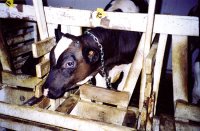Meat Farming: Antibiotics and the Meat we Eat

Meat Farming: A Look into what we Eat...

We know that ranchers and farmers have been feeding small doses of antibiotics to farm animals daily so that they might gain as much as 3 percent more body weight, a huge deal when profits are involved. Such antibiotics like tetracycline are thoughts to kill the flora living in the animals’ intestines and this helps the animals utilize their food more efficiently adding to their weight gain.
The main concern is that antibiotics used to treat human illnesses are put into the animals’ food and drink and over time creates a type of super bacteria that is resistant to the drug. This resistance can be passed on to humans can pose a great human health risk when you think of what might happen on a global scale when our antibiotics are no longer effective in fighting our illnesses.
It is estimated that there are 15-17 million pounds of antibiotics used sub-therapeutically in the United States each year. Antibiotics are given to animals for therapeutic reasons, but this use isn't as controversial even though there are ethical as well as heath concerns involved when sick animals are used for meat farming. The conditions the animals are raised under in meat farms could be a reason for the number of sick animals needing medication.
Concern about the growing level of drug-resistant bacteria has led to the banning of sub-therapeutic use of antibiotics in meat animals in many countries in the European Union and Canada. In the United States, however, such use is still legal. The World Health Organization is concerned enough about antibiotic resistance to suggest significantly lowering the use of antibiotics in the animals we eat. In a recent report, the WHO declared its intention to "reduce the overuse and misuse of antimicrobials in food animals for the protection of human health." Specifically, the WHO recommended that prescriptions be required for all antibiotics used to treat sick food animals, and urged efforts to "terminate or rapidly phase out antimicrobials for growth promotion if they are used for human treatment."
A study from the New England Journal of Medicine done in 2001 found that: 20 percent of ground meat obtained in supermarkets contained salmonella. Of that 20 percent that was contaminated with salmonella, 84 percent was resistant to at least one form of antibiotic.
Lowering or halting sub-therapeutic antibiotic use in animal production could have serious economic effects on the meat and poultry industry. According to the same report, U.S. hog producers saved about $63 million in feed costs in 1999 due to their use of low levels of sub-therapeutic drugs; they would have suffered an estimated loss of $45.5 million in 1999 if the drug use was banned.
Despite these statistics, even within the industry, there is a growing movement to reduce at least the sub-therapeutic use of antibiotics in animals raised for food. Tyson Foods, Perdue Farms and Foster Farms, which collectively produce a third of the chicken Americans eat, recently declared their intention to greatly reduce the amount of antibiotics fed to healthy chicken. There is still no way for consumers to know whether one of these companies' chickens has been treated with antibiotics, although some corporate consumers, McDonald's, Wendy's and Popeye's among them, are refusing to buy chicken that has been treated with fluoroquinolones. Increased public pressure may cause the companies who grow animals for food to collectively decide that putting extra weight on feed animals isn't worth the possibility that they are putting consumers' health at risk.
Along with the consumer's health risk I think as consumers we have an ethical responsibility to look at the process by which we recieve our meat products and evaluate the standards by which the animals were raised and slughtered. Is the production process ethical? Is it humane? If it is not, does this go about adding to the health risks we face when we eat altered, sick and unhealthy animals?

Here is a book by author Madeline Drexler, former medical columist for the Boston Globe. In her book, Secret Agents, she argues that farm animals in this country live in unmatched squalor. "The site of modern meat production," she writes in her book, is akin to a walled medieval city, where waste is tossed out the window, sewage runs down the street, and feed and drinking water are routinely contaminated by fecal material."
Pigs are held here until they are 250 lbs,about 6 months old. Then they are taken to slaughter.

Turkeys going into the slaughter:

Below is a flash animation video about the meat you eat that is informative and hopefully entertaining. Take time to watch it for a quick overview of meat farming in America today.
http://www.themeatrix.com/
Here are some ideas for how you can take action to help protect our foods.
Take Action Now:
http://www.democracyinaction.org/dia/organizationsORG/fwwatch/campaign.jsp?campaign_KEY=3181
More good ideas are buying ORGANICALLY CERTIFIED foods that do not have hormones or drugs fed to the animals, as well as buying FREE RANGE meats where the animals are spaced and raised humanely for a natural and healthier meat.

0 Comments:
Post a Comment
<< Home